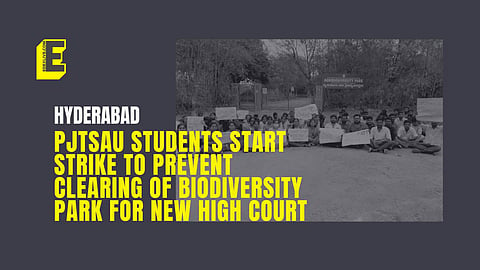

Students and scholars of the Professor Jayashankar Telangana State Agricultural University (PJTSAU) in Hyderabad are going on a complete strike from today, January 11, in protest of the Telangana Government’s allocation of the university’s land for the construction of the new Telangana High Court premises.
Under this order to the Ministry of Law, Government Order 55 (GO 55), about 50 acres of land from PJTSAU have been allotted for the construction of the new court.
However, this order shocked the students of the PJTSAU – as this allotted land includes the agri-biodiversity park on the campus. They say that under this order, the future of this park, built painstakingly over 35 years, will be in jeopardy.
Protesting against GO 55, the students of the university staged a dharna on the campus, which is located in Rajendranagar in the city on Wednesday, January 10, led mainly by PhD scholars and postgraduate students.
A biodiversity hot spot in the city
The most pressing concern of the students with the order is how the construction of the new court building would affect the flora and fauna thriving in the park.
“There are about two lakh fifty thousand trees and plants in the park, each worth more than Rs 32 lakh,” says Sathyamurthy Nayak, President of the PhD Scholars’ Association at the university.
Adding to this, Bonthala Madhukar, a second-year PhD scholar from the Agronomy Department of the university says that the park is home to 439 species of plants – which includes 80 species of trees, 206 species of herbs, 56 species of shrubs, and 143 medicinal plant species – and 348 species of animals – which includes 16 species of mammals, 139 species of birds, 42 species of reptiles, and 151 species of invertebrates.
The plant life in the Agro-Biodiversity Park comprises species found all over India, Sathyamurthy says.
He adds, “The forest cover of the park is so thick, that it is responsible for most of the oxygen production in the city – to the extent that it is referred to as the Lungs of Hyderabad. This forest cover also helps keep the campus two to three degrees cooler than the rest of the city.”
“Further, the park also hosts various endangered animal species,” Madhukar adds. According to a poster circulated by the protesting scholars, these species include the red-necked falcon (Falco chicquera), the Indian black turtle (Melanochelys trijuga), the oriental darter (Anhinga melanogaster), and the painted stork (Mycteria leucocephala), and more.
Unlike in zoos, he says that these animals are left in the open in the park. He also adds that the park is home to a butterfly farm, and various plants to host the butterflies.
The students add that it took decades of labour and dedication to create this safe haven for plant and animal life in the university. “The park has reached where it currently is after 35 years of hard work. Each student personally planted 10 trees each under the Haritha Haram Programme,” Madhukar says and adds that it is difficult to replicate the same environment elsewhere, as it would put the plants and animals in the park in danger.
“It would be disheartening for many students and professors of the university if the park was cleared off,” he says.
A blow to research
In addition to the various plants and animals, the Agro-Diversity Park is also host to the research centres for Drone Technology, Medicinal and Aromatic Plants, Biodiversity, and Agroforestry of the university.
“PJTSAU has produced world-class agricultural research and scientists, who have flourished all over the world. In addition, researchers and scientists from various other countries have visited the university specifically to study the plants in the Agri-Biodiversity Park,” Sathyamurthy says.
Elaborating on the research projects undertaken by the campus, Madhukar says, “The research we conduct is extremely beneficial to the agriculture sector, and aids farmers greatly. For instance, we study the feasibility of food crops and fodder crops, and the most profitable ways for farmers to grow them. We are also working on finding out what crops support the growth of teakwood trees, which is a rare species.”
He adds that to date, the Agri-Biodiversity Park aided four students from the university in their research theses.
According to the students, this research has only been possible because of the environment they could build and cultivate on the campus. “If the university land is cleared for the court, we will have to rebuild these capabilities from scratch,” Madhukar says.
Gov’t plotting to take over university land, allege students
The students are also accusing the Government of Telangana of trying to acquire the land of the university and using it for the convenience of government officials.
“Currently, all the guest houses and residential areas in the campus, which are meant for the vice-chancellor and other staff, are being used as living areas for IAS officers and offices for police officers,” alleges Bhanu Chander, an MSc student at the university.
He also alleges that a part of the university’s land was transferred to property development company Prestige Group for its Prestige City Hyderabad project.
Moreover, these decisions are being taken without the consultation of the students, he further says. “The university administration is also helpless in this regard; they can only comply,” Bhanu Chander sighs.
“With the government’s actions, it is clear that they want to move the university campus to another location,” Madhukar says.
Sathyamurthy affirms that the strike will continue as long as GO 55 is not nullified. “We are not against infrastructural developments in Telangana, but rather the destruction of our campus and biodiversity in general,” he adds.
